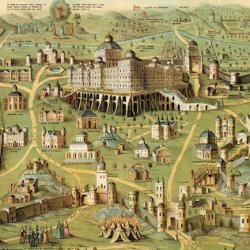Some thoughts inspired by Dale Ralph Davis’ commentary on 2 Kings 12.
The opening verses of 2 Kings 12 are formulaic. We have heard these words before, again and again, ad nausea in the history of 1-2 Kings: In the such and such year of so and so King of Israel, so and so king of Judah began to reign. He reigned for so many years, and he was faithful or not, doing or not doing right in the sight of the Lord. Our eyes glaze and we skim past these verses to get to the real story.
But we ought not.
Though these words are deceptively simple, in the context of 1-2 Kings, they announce good news; they are a gospel declaration. The previous chapter, after all, began not with this formula but with the political murders of Athaliah, and the threat to the Davidic dynasty. The writer of 1-2 Kings never gives Athaliah a formula; it’s as if she never reigned at all, as if her reign is a surd element in the history of Judah that cannot be encompassed by chronology. During Athaliah’s reign, chronology has ceased; time, at least the time of David, is no more; the times are out of joint. The absence of the formula is the absence of order, regularity, routine.
Yet, by the time we get to the beginning of chapter 12, it’s all been put right, by the heroic and decisive action of Jehosheba and Jehoiada, by the grace of God. The formulaic opening verses of chapter 12 indicate that time is started again, the clock of David has been repaired. That apparently boring formula is as bright and hopeful as the sunrise after a week of gloomy weather, the calm after a family storm has passed, the return to the tedium of daily work after a period of unemployment, the restoration of order after a violent revolution. Routine can become boring; but returning to routine after the routine is disrupted feels like a resurrection. Verses 1-3 are a sigh of relief.
But the import of these opening verses goes much further than that. When the Davidic dynasty was threatened, what was being threatened was not simply the political order and peace of Israel. The disruption of the Davidic dynasty in chapter 11 is a threat to the promise of God, the promise that David would have a son to sit on his throne forever. The announcement that Joash, a legitimate descendant of David, is on the throne, and reigns for 40 years, is an evangelical announcement that God keeps His promises, and that the threats and murders of all the world’s Athaliahs will not prevent that promise from being fulfilled. The return to normalcy is a blessing for Israel, but it is more: It is a vindication of God. 2 Kings 12:1-3 say, “God is in His heaven; all will be right with the world.”















